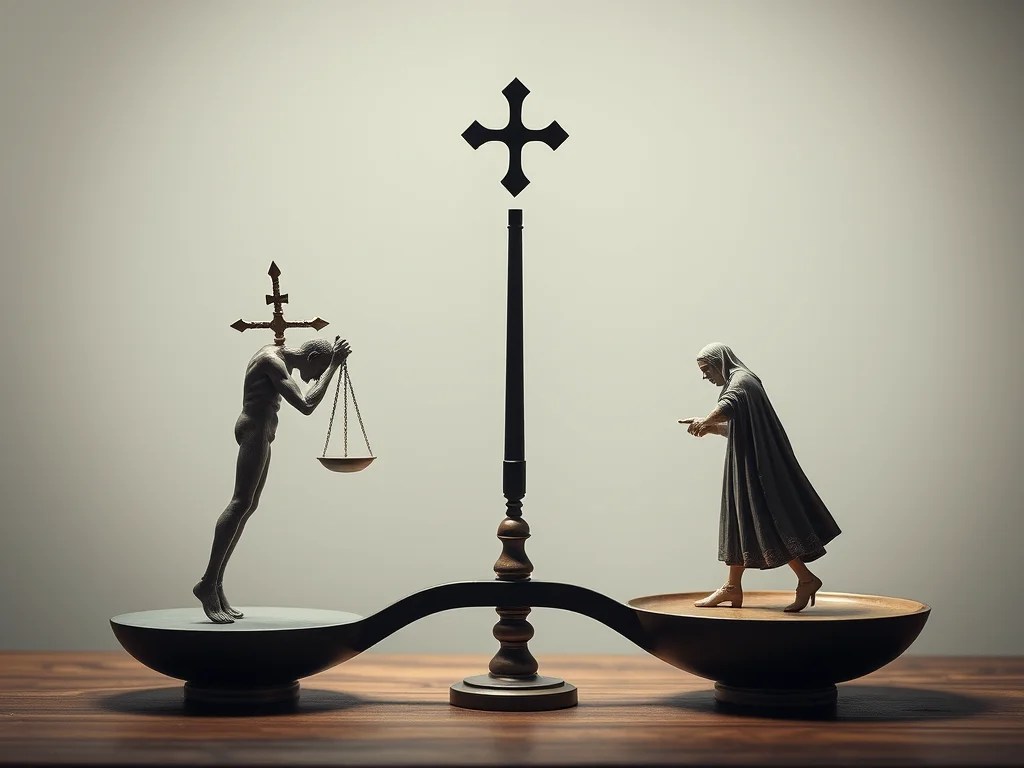Difference between Ethics and Religion, Ethics UPSC, Ethics vs Religions UPSC. Ethics vs Religions UPPCS.

Table of Contents
Ethics vs Religions
Religion is a system of beliefs, and values based on the worship of a higher power or deity. It often includes doctrines and moral codes prescribed by religious texts considered as immutable due to divine origin.
Ethics is an idealistic science that attempts to set established standards for voluntary human behaviour to achieve Summum bonum (Highest Good). These standards are based on logical thinking, critical analysis, philosophical inquiry, and systematic reasoning. It also evaluates human’s conducts based on these set standards if any moral conflict arises in society.
Similarity:
- Both ethics and religions provide Moral Guidance for determining what is right and wrong
- Both often promote similar core values and principles such as honesty, integrity, compassion, and justice
- Both aim to regulate human behaviour to promote social harmony and individual well-being.
- Both contribute to the maintenance of social order and the functioning of communities
Difference:
| Ethics | Religion |
| Derives authority from rational thought, philosophical reasoning | Derives authority from divine revelation, sacred texts, and religious traditions Sabarimala temple women entry case Haji Ali Dargah women entry case Circumcision (khatana) in Male – remove the skin that covers the tip of the penis Genital mutilation (Khatna) in Female – total or partial removal of the clitoral hood |
| Critical thinking based | Scripture based |
| Can be secular and apply universally across different cultures | Often specific to particular faith traditions |
| More flexible and adaptable to changing societal norms | Often more rigid, with established doctrines and dogmas that may resist change |
| More objective, relying on universal principles and logical reasoning. | More subjective, based on personal faith and spiritual experiences |
| Tangible | Intangible |
Interrelationship:
- Many ethical principles are rooted in religious teachings
- Treat others the way you want to be treated
- Religion often motivates ethical behaviour
- Concept of sin-virtue and heaven-hell
- Ethics and religion can complement each other. Religion providing the moral foundation and ethics offering a rational, systematic approach to applying these principles. In actual ethics convert the intangible value of religions into tangible and more applicable standards.
Conflict:
- When old religious belief, customs and traditions conflicts with ethical principles
- Denied abortion due to religious belief-based law like Savita Halappanavar Death case of Ireland
- Misinterpretation of religious text
- Jihad – kill the devil inside you or kill people of other religion
- Triple Talak
- Lack of proper understanding of own as well as other’s religion
- Depends on oral preach, not studying religious text herself
- Growing intolerance in society
- Fear factor like Concept of sin-virtue and heaven-hell also sometimes force to behave against ethical values
- Like in movie the Kerala story
Solution:
- Judicial intervention
- Sabrimala temple entry case
- Legal reforms
- Protection of Civil Rights Act, 1955, Dowry prohibition act, 1961 (CM prioritise over SM by government)
- Social reforms movements
- SC/ST rights movements, Women rights movement
- Promote True knowledge of religion
- Based on love not on fear (Mazhab Nahi Sikhata Aapas Mein Bair Rakhna)
- ‘For great men, religion is a way of making friends; small people make religion a fighting tool.’ – A.P.J. Abdul Kalam
- Philosophical theory like deontology and teleology
- Promoting education to develop critical thinking
Application in Public Administration:
- Codes of ethics for public officials often include principles derived from both ethical theories and religious values.
- Civil servant must follow constitutional mandates to ensure integrity, transparency, and accountability in their actions and must be culturally sensitive and respect the religious beliefs of diverse populations to maintain public trust, people’s participation, acceptability, effectiveness, maintain law and order and ensure social cohesion.
Is Ethics can exist without religion?
Religion and ethics are largely inseparable till 13th century. Ethics will separate from religion especially Christianity, by Thomas Aquinas who gave the concept of various type of Law.
Ethics and religion complement each other, with religion providing the moral foundation and ethics offering a rational, systematic approach to applying these principles in diverse contexts.
Since all religion are based on some foundation values and they propagate these values which form the basis of ethics and hence ethics is profoundly influenced by religion.
But in theory, ethics can exist without religion.
Secular Ethics, branch of moral philosophy, based on human faculties such as logic, reason, or moral intuition, and not derived from supernatural revelation or guidance, many Philosophers like Immanuel Kant, John Stuart Mill, and Aristotle follow this
Diverse Ethical Philosophies, such as consequentialism, deontology, virtue ethics, and contractarianism determining ethical behavior without reference to religion.
Secularism – separation and non-interference of state with religion
Humanism is based on critical thinking and evidence and belief that humans can determine right from wrong based on their own experiences, feelings, and thoughts.
Moral intuitions and empathy are natural human traits that do not require religious justification. Evolutionary biology and psychology suggest that these traits have developed to promote social cooperation and cohesion.
Cultural and Social Constructs, Ethics is a set of rules or guidelines created by societies to promote harmonious living
Modern legal systems and secular institutions often operate on ethical principles that are separate from religious doctrines
Overall, while religion has historically been a source of ethical guidance for many people, it is not a necessary condition for the existence or understanding of ethics. Ethics can exist without religion. Atheist person can also be an ethical person. Ethics can be grounded in human reason, empathy, societal norms, and philosophical inquiry.
List of Major Moral values espoused by major religions in India
Hinduism:
- Veda/Upanishad – Victory of Satya (Truth), Satyamev Jayate, Brahmacharya (Celibacy/Chastity)
- Mahabharata – Dharma (Righteousness), Karma (Action and Consequences), Fight of Truth over Evil
- Gita – Nishkam Karma, follow you Duty, Overcome Desire, Means based conduct, selflessness
- Ramayana – Adherence to truth, Respect for Elders, Ramya Rajya
Buddhism:
- Middle Path
- Controlling Desire
Islam:
- Equality
- Charity (Zakat)
Christianity:
- Love
- Forgiveness
- Compassion
Sikhism:
- Compassion (Daya)
- Service (Seva)
- Courage (Himmat)
Jainism:
- Ahimsa (Non-violence)
- Satya (Truthfulness)
- Asteya (Non-stealing)
- Brahmacharya (Chastity)
- Aparigraha (Non-possessiveness)
Conflict between ethics and religion:
- Due to Narrow interpretation, lack of right knowledge, Intolerance religion has become a source of tension, insecurity in society rather security peace and harmony.
- ‘For great men, religion is a way of making friends; small people make religion a fighting tool.’ – A. P. J. Abdul Kalam
- Lack of right understanding of religion is the main cause. In actual, Religion is passing on oral history. Most of the people don’t know about their own religion as well as other’s religion.
Ethics PYQs UPSC – Topic Wise Collection
FAQs on Ethics vs Religions UPSC
Coming Soon
Why Mohit Sharma (Director Sankalp IAS Academy) is the best Ethics Teacher for UPSC Ethics GS IV?
Why Mohit Sharma (Director Sankalp IAS Academy) is the best Ethics Faculty for UPSC Ethics GS IV?
Mohit Sharma is a highly regarded Ethics faculty for the UPSC Civil Services Examination, known for his in-depth knowledge, engaging teaching style, and focus on practical application.
With over 12 years of experience in teaching Ethics for UPSC and University Level, he provides a comprehensive understanding of the entire syllabus, covering all key topics and subtopics in detail. Here are some key reasons why many consider him to be among the best:
- Authorship in Ethics: As an author of multiple books on ethics and moral philosophy, he brings a strong theoretical foundation and insightful perspectives to his teaching.
- Positive Reviews and Testimonials: Many successful UPSC aspirants have praised Mohit Sharma’s teaching and guidance, attributing their success to his mentorship.
- Current Affairs Integration: Connects ethical concepts with contemporary issues. Uses recent case studies from administration Helps students relate theory to real-world scenarios.
- Comprehensive Coverage: Mohit Sharma provides a thorough understanding of the entire Ethics syllabus, covering all key topics and subtopics in detail.
- Conceptual Clarity: He emphasizes conceptual clarity and helps students grasp complex ethical dilemmas and frameworks.
- Case Study Approach: His teaching methodology heavily relies on case studies and real-life examples, making the subject more relatable and easier to understand.
- Focus on Answer Writing: Mohit Sharma provides extensive guidance on answer writing, helping students structure their answers effectively and present their arguments convincingly.
- Personalized Mentoring: One-on-one doubt clearing sessions. Individual feedback on answer writing. Customized guidance based on student needs.
- Regular Practice and Feedback: He encourages regular practice through mock tests and assignments, providing personalized feedback to help students improve.
- Focus on Previous Years’ Questions: Detailed analysis of UPSC trends. Strategic approach to important topics. Practice with exam-oriented questions.
- Online Learning Resources: Digital study materials. Recorded lectures for revision. Online test series.
- Holistic Development Approach: Integration with other GS papers. Emphasis on character building. Focus on developing ethical reasoning skills.
Best Ethics Book for UPSC & UPPCS GS IV:
Ethical Insights for Future Administrators (6th Edition, English)
Top rated on Google. Recommended by UPSC Toppers. Language – English This book Ethics for UPSC is Written by Mohit Sharma (Director of Sankalp IAS Academy). Mohit Sharma is a highly regarded Ethics faculty for the UPSC Civil Services Examination, known for his in-depth knowledge, engaging teaching style, and focus on practical application. With over 12 years of experience in teaching Ethics for UPSC and University Level. Download Free Demo eBook
Ethics vs Religions
Ethics UPSC


As a student preparing for the UPSC, I found the section on ‘Why Mohit Sharma is the best Ethics Teacher’ to be very reassuring. This article itself is a testament to the quality of his teaching and material.